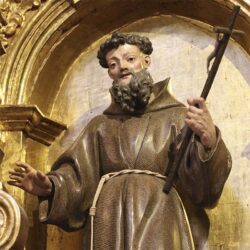On 21 July, the Church celebrates St. Lawrence of Brindisi. His countenance bore the marks of mortification, his gaze showed the wisdom proper to those who contemplate supernatural realities and his worn and austere habit proclaimed the renunciation of worldly pleasures and frivolities.
Newsroom (23/07/2022 13:00, Gaudium Press) St. Lawrence of Brindisi was born on 22 July 1559 – the feast day of St. Mary Magdalene, to whom he had a deep devotion all his life – in the Italian city of Brindisi, given at his baptism the name of Julius Caesar. It is said that shortly before his birth, a heavenly light shone around his mother many times, seeming to presage a glorious future for the unborn child.
From a very tender infancy he showed himself to be possessed of a singularly pious soul. At the age of four he was left under the tutelage of the friars of the Franciscan convent of St. Paul the Hermit in his home town, in order to receive a solid formation there. The seriousness and solidity of his behaviour caused admiration even among the most observant religious members.
He soon began the study of the Sacred Scriptures and, having been gifted by Providence with a spectacular memory, he repeated with accuracy and liveliness the sermons he heard. The friars were astonished to hear him, and not infrequently they called him to preach at their convent chapters.
He was only six years old when Archbishop Francisco Alcander, drawn by his fame, wanted to hear him preach. To make Lawrence more comfortable, the prelate disguised himself among the faithful and was subsequently charmed by the wisdom of the child, who spoke with the brilliance of the Apostle.
The very young preacher’s sermons were attended not only by children, but also by many adults. With unpretentious ease he discoursed on the truths of the Faith, repeating teachings learned on various occasions, drawing souls to conversion.
Preparing himself for the arduous struggles ahead
The future Brother Lawrence had encountered those who formed him. Although they highly esteemed his talent, they never praised him in their presence. They were able to initiate him in both the human and divine sciences, and since the boy excelled in the human sciences, he should also reach the pinnacle in the divine sciences. The practice of virtue, mortifications and humility were also required of him. It was natural for him to leave the pulpit and dedicate himself to the humble tasks of the convent such as sweeping the yard, scrubbing the floor and the like.
At the age of fourteen this Julius Caesar was still living among the conventual Friars of St. Paul the Hermit, and he planned to remain there until the end of his days. However, he was forced by circumstances to move to Venice, where he continued his studies in a school conducted by his uncle, Pietro Rossi, a man of virtue and doctrine, and found in the Capuchins his true vocation.
In order to enter this branch of the seraphic Franciscan Order, he intensified his life of piety and penance: he disciplined himself frequently, slept little and on boards, fasted three times a week and wore a sackcloth. Like a true warrior, he strengthened himself for the arduous struggles he would have to fight in the various and risky fields reserved for him by Divine Providence.
Devotion to his vocation
He spent all his free time among the Capuchins of Venice until he was admitted as a novice in Verona. On 18 February 1575 he received the habit and the name that, for his holiness, was to shine forth in the firmament of the Church: Brother Lawrence of Brindisi.
During his novitiate he underwent great trials of soul and body. He was afflicted by various illnesses, but he suffered gladly, out of love for God and the Blessed Virgin, to whom he had consecrated himself.
In 1576, he made his solemn profession of vows and wished to be a lay brother only. His superiors, however, advised him to embrace the priestly way, for which purpose they sent him to Padua to study philosophy. In 1582, at the age of 23, he was ordained to the priesthood and soon accumulated the duties of preacher, master of novices and professor of theology. Twenty years later he was elected Superior General.
Ardent devotion to the Holy Mass
He celebrated the Holy Eucharist with unusual recollection and devotion, and it was not unusual to find him in ecstasy during the Holy Sacrifice.
In apostolic and diplomatic embassies one of his concerns was to ensure a place where he could celebrate the Mass. Fr. Gasparotti especially remembers a trip to Switzerland when Brother Lawrence did not hesitate to walk twenty miles one afternoon and twenty miles more the next morning through Protestant lands. When at last he reached a Catholic village, “he celebrated Mass with his usual devotion and communicated it to us”.
In his last years, much suffering afflicted Brother Lawrence, caused above all by gout. This worsened to the point that he could not move or be touched by anyone without feeling great pain. Even in this state, says another of his companions, Fr. Giovanni Maria di Monteforte, “he always wanted to celebrate Holy Mass. I helped carry him to the altar. There he regained his strength as he put on the sacred vestments. When he had finished dressing himself, he had enough energy to overcome his illness and celebrated Holy Mass standing up. [When the Mass was over and the sacred vestments had been removed, he was again indisposed and had to be carried back to his bed.]
Miracles he performed during his lifetime
People came to him to be freed from illnesses of both soul and body, and for this reason he was called the “Holy Father” by the people.
His canonization process mentions “ninety-seven miracles worked during his lifetime”. One of the beneficiaries, Giacomo delle Perlefalse, had been a blind child for more than a year. After taking him to several doctors, without any result, his mother decided to turn to the Capuchin Saint. The miraculously healed child later recounts: “I felt him touch my eyes with his fingers and immediately I began to see, and the pain in my eyes stopped.”
Fearlessness in defense of the Church
However, the greatest glory of Saint Lawrence was not that of performing miracles, and he did them only to unite souls more closely to God. His great merit was that of preaching with fearlessness in defense of the Holy Church.
Wherever he went, he preached with ardor against sins, moving hearts and converting multitudes in various Italian cities, such as Naples, Mantua, Genoa, Padua, Verona, Milan, and more. He defended the truths of religion with such love that the Archbishop of Pavia called him “the new St Paul”.
His ability, however, did not come only from human qualities. Once, when Fr. Semproni asked him how he managed to preach without prior preparation, he replied: “When I begin to preach, intelligence and memory open up”. And with a hand gesture he indicated that it was as if he were reading from an open book. And to another Capuchin, Andrew of Venice, he confided that what he knew “was by the most special grace of God, who had infused in him the whole doctrine of His Divine Majesty, in particular the Greek, Hebrew and Chaldean languages”.
From his priestly ordination until his death, St. Lawrence carried out the most diverse missions. He travelled on foot through almost all the Catholic nations of Europe, sometimes as Superior-General of the Order, sometimes as ambassador of peace, sometimes as envoy of the emperor or the pope to coordinate the Catholic princes in the fight against heresy and the Turkish invasion.
Heroic faith on the battlefield
Day and night this Saint carried around his neck a wooden Cross, about a span long, in which he had inlaid various relics. This was his only instrument to bless people or to defend himself when he was forced to act in wartime situations.
An eyewitness, Carlos de Vicecones, described the participation of St. Lawrence in the battle of Alba Real, now Belgrade, the first of many in which he had to be present, as follows: “The Father wore no armour, nor did he defend himself, but with his simple Capuchin habit and a Cross in his hand he moved about everywhere, fearlessly carrying out his office. The city of Belgrade was easily and happily conquered, but shortly afterwards the Turkish army attacked with great force. Father Brindisi ran from one side to the other, always encouraging them. And not only in private, but he preached in a loud voice, exhorted us to remain firm, not to give ground, announcing that the victory would be ours”.
In the same battle, Fr. Ambrose of Florence recalls that St. Lawrence’s horse got between the enemies and he was not killed only because the animal turned around. Two Christian officers came to his rescue and asked him to move away because he was in a very dangerous area. He replied, “Sirs, forward, forward! This is my place. Victory! Victory! Victory!” And Fr. Jean-Marie de Monteforte relates that, on another occasion, Brother Lawrence felt a blow from a scimitar, but “by the grace of God and of the Blessed Virgin, it did me no harm”, he explained.
Br. Giovanni Battista of Mantua tells how, during a battle in Hungary, he saw Fr. Brindisi turn back the enemy’s artillery shells with the sign of the Cross, so that they “would return against the riflemen or fall to the ground halfway without hitting the Christians”.
St. Lawrence was fully convinced that the Divine Redeemer never abandons his children, even in the most difficult circumstances.
Apostolic Doctor of the Church and love for Mary
Remains of St Laurent of Brindisi – Monastery of La Anunciada, Villafranca del Bierzo (Spain)
Special mention should also be made of the vast and fruitful written material of Saint Lawrence. After examining it for ten years, the Sacred Congregation of Rites approved it, giving this significant praise to its author: “He can truly be counted among the Holy Fathers”. In 1959 he was proclaimed an Apostolic Doctor of the Church by the Holy See.
No less noteworthy is the deep love he shows for the Blessed Virgin Mary in his works. St. Lawrence never missed an opportunity to exalt and sing her praises. After all, is not Our Lady God’s most exalted dwelling among men?
Compiled by Sandra Chisholm

































